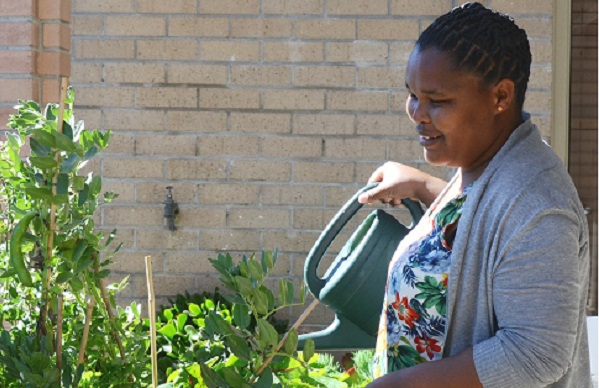One of the most significant things that I have my rural roots to thank for is the habit of growing my own food. I learned it from an early age and I am still very much a ‘farmer’ at heart, writes Bulelwa Makalima-Ngewana.
My dad had three huge productive gardens – one for cultivating fruit trees and cattle feed, another for wheat and mielies, and a third for vegetables. As kids, our after-school chores included helping with watering, pest control and harvesting. Our reward? We enjoyed the fruits of our labour, together with an empowering sense of self-reliance.
To this day, I love seeing things grow, and my own garden is more productive than pretty. Since moving to the city I have been greatly inspired by Jane Griffiths, writer, artist and television producer who’s been growing organic vegetables at her Auckland Park home for over fifteen years. I follow her blog fanatically, and I am reminded constantly of how healthy, nurturing and cost effective it is to sow and reap one’s own food.
There’s a quote at the top of Jane’s blog, by Mahatma Gandhi, that says, “To forget how to dig the earth and tend the soil is to forget our selves.” In explaining her personal motivation for becoming an urban farmer, she notes ever-increasing food prices, the health benefits of organically grown produce, and a reduced impact on the planet as key reasons. She also says that, with some 70% of all people predicted to be living in cities by 2050, estimates are that food production will need to double to feed them. How will we manage? “Urban farming will be the food of the future,” she declares.
From a personal and professional perspective, I absolutely agree.
In the past few months, through my family’s participation in the “My Green Home” challenge, I’ve become much more aware of the true cost of convenience when it comes to the carbon footprint of most store-bought food – and of asking myself, “how far has the food on my plate travelled?” Whereas in the past I would not have paid much attention to the product origin labels on food, I now scrutinise them and, wherever possible, try to buy local. (Unless, of course, I can grow it myself.)
I realise that I am privileged to have access to a moderately sized suburban yard to cultivate, and at the moment my home-based produce garden is largely for my family’s satisfaction (and sense of sustainability) rather than for our subsistence. While we’re becoming much more conscious, as a family, of issues of food security, the threat still seems distant and abstract. For a growing number of Capetonians, however, food security is a very real daily worry.
When talking about inclusive urban regeneration and a sustainable future for Cape Town, food is a fundamental part of the conversation – it is linked to health, homes, family, dignity and livelihoods. Urban agriculture is also important to the history and memorialisation of our city, since it plays a key part in Cape Town’s heritage – the Company’s Garden was developed over 360 years ago to supply produce to the ships that travelled the spice trade route to the East Indies. Food is political, in that the patterns of food production and distribution mirror the spatial patterns of Cape Town. And, of course, food security is a real concern – one that will affect all Capetonians, as it will people in cities across the globe.
Urban agriculture is impossible without an enabling policy environment. The City of Cape Town’s extensive policy in this regard opens the door for urban agriculture to play a pivotal role in poverty alleviation and economic development.
At the Cape Town Partnership we, together with many partner organisations and individuals, believe there is an urgent need to embrace urban agriculture on a citywide scale – from town to township, and across socio-economic divides.In order to facilitate wide-ranging conversations around these issues, and to build a greater understanding of how Cape Town can create opportunities for food growth, the Cape Town Partnership recently launched a platform called Green Clusters. An official World Design Capital 2014 project, it aims to foster collaborative dialogue around urban agriculture in Cape Town, and to connect and nurture the many inspiring initiatives that are already happening – whether spearheaded by NGOs, community groups, governments departments or active citizens.With a focus on design as a motivator for social change in 2014, the Green Clusters conversation pivots around how processes and systems can be designed, collaboratively, to create opportunities for urban agriculture in Cape Town.How can we create more opportunities for women and youth in urban agriculture?
What urban agricultural forms are appropriate in lower-income areas? What market possibilities and economic growth models can be explored for urban agriculture? How can we be flexible enough as a city to acknowledge new solutions, specifically around food?It has been heartening to see the ways in which people are collaborating to create opportunities for urban dignity in Cape Town. Already, there are many pioneering urban farming initiatives and inspiring, citizen-driven food projects happening throughout our city – all positively impacting their neighborhoods, whether town or township, and some spanning both contexts.Just this weekend, the Haven Night Shelter in District Six got a much-needed food garden. The first to be planted by a project called City of Eden, applying forest ecology design principles, the garden will offset costs and improve the wellbeing of the people who stay at the shelter. Working with a range of partners, like Urban Harvest, and volunteers, City of Eden’s long-term goal is to transform Cape Town into ‘an edible city’. Their first garden has been named The Forever (Henry) Young Garden, paying tribute to Henry Young, a homeless man whose last months were spent at the Haven and whose story inspired the establishment of City of Eden.

In Mitchells Plain, award-winning non-profit, SEED, has been operating for 12 years, developing groundbreaking programmes that span education, demonstration and employment-creation. SEED started out with the aim of growing ‘a movement of schools where curriculum-based learning connects children to the ecosystems that support them, while filling tummies with organic food.’ Today they also promote food gardening to boost food security in homes that need it the most –Mitchells Plain Food Freedom involves the mentoring and support of a group of community activists to support 100 local home gardeners. SEED’s economic empowerment programmes include Youth Training for the Green Economy and a Community Enterprise Incubator. For a donation of R300, SEED is able to supply a Cape Flats household with seedlings for a year, while a donation of R7 000 funds a bursary for Accredited Youth Training in Applied Permaculture.
In Hout Bay’s Hangberg community, an informal settlement with very limited space for farming, The Lighthouse Project is using design interventions to jointly address issues of housing, land availability and food. They’re in the process of piloting a flood proof structure that provides dignified accommodation, keeps warm in winter and cool in summer, and integrates space for vertical food gardens. At the heart of the initiative is an ongoing and robust communal dialogue between the residents and the design team about common amenities and the importance of land. In many informal settlements, the density of housing also makes it difficult to find open arable land for urban agriculture. The use of vertical gardens can provide possible solutions.
In Nyanga and Khayelitsha, Abalimi Bezekhaya (“Farmers of the Home”) has had great success in encouraging and supporting residents to grow organic vegetables, initially to feed their families. Now, with vegetables being grown in literally hundreds of township gardens, some of these micro-farmers are producing a surplus of high quality organically grown produce. Abalimi’s Harvest of Hope marketing project has created access to markets outside of the immediate neighborhood, selling produce on behalf of these urban farmers via a weekly organic box scheme.
In Tamboerskloof, a group of entrepreneurial youth with permaculture experience (gained through training at SEED) has transformed an under-utilised plot – owned by the Department of Public Works – into Tyisa Nabanye, a productive urban farm that provides them with a home and a livelihood.
Nearby, on a much larger scale, the Oranjezicht City Farm is doing an important job of raising awareness around urban farming. By introducing urban agriculture in an upmarket residential neighborhood, and enlisting scores of local volunteers to muck in, they are shifting perceptions, sharing knowledge and instilling healthy, ‘buy local’ shopping habits.
The Company’s Garden will soon be home to a Madame Zingara restaurant, as well as a new food garden. Setting a great example for active business citizenry, the restaurant has committed to sourcing its fresh produce from the Oranjezicht City Farm until the Company’s Garden food garden is established.
By laying the foundations for institutional collaboration amongst urban farmers, and by speaking with one voice to create awareness of the complex land issue, we hope to build a network of urban agriculture opportunities in Cape Town. Ultimately, the conversation is about the importance of food, and its role in effecting more resilient and healthy urban livelihoods.
And, at the Cape Town Partnership offices in Bree Street, we’ve done our bit to walk the talk, transforming our previously under-used balcony into a productive herb and vegetable garden a year ago, with the help of OwnGrown. The harvest from our small urban agriculture initiative offers abundant daily supplies of healthy and delicious produce for sandwiches and salads, and I have seen first-hand the amount of enthusiasm that team members have developed for our balcony garden.
What simple, practical changes could you make to secure our city’s sustainability and health?
 MY URBAN HEART series – Making ‘our edible’ City Grow by Bulelwa Makalima-Ngewana, CEO of the Cape Town Partnership, first published in The Cape Times.
MY URBAN HEART series – Making ‘our edible’ City Grow by Bulelwa Makalima-Ngewana, CEO of the Cape Town Partnership, first published in The Cape Times.
Talk to her @darksjokolade






